RCPath Achievment Awards 2024 Winners
To celebrate excellence in pathology practice and promote high standards in pathology education, training and research to deliver the best patient care, the College (RCPath) established the RCPath Achievement Awards. These awards complement the College’s existing schemes that celebrate public engagement and research.
There are 6 RCPath Achievement Awards. Four team awards and 2 awards for a new category of Sustainability.
RCPath Achievement Awards 2024 - Team awards
Liverpool Clinical Laboratories Infection and Immunity Research, Development and Innovation Team
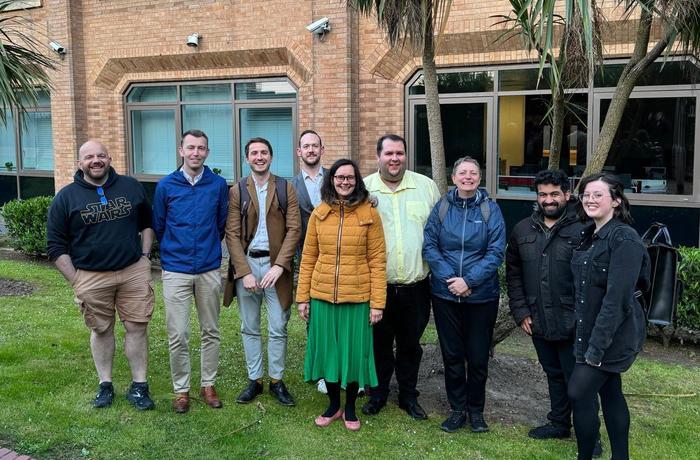
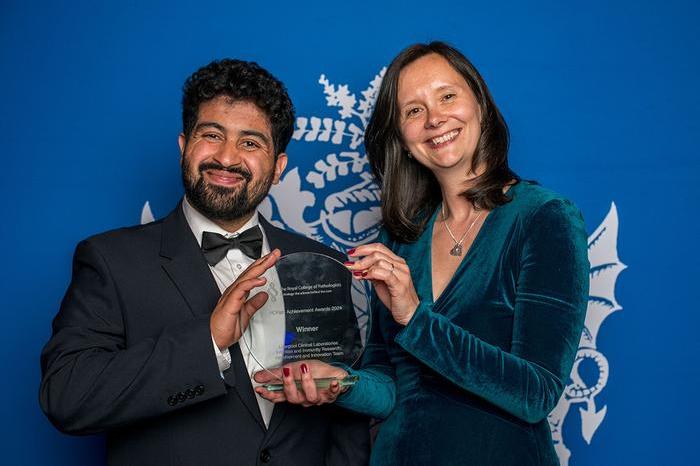
Dr Edward Cunningham-Oakes and Dr Anna Smielewska.
The Infection and Immunity Research, Development and Innovation team at Liverpool Clinical Laboratories, in collaboration with the Centre of Genomic Research, University of Liverpool, have established a novel 16S Oxford Nanopore sequencing assay in routine clinical usage with a turnaround of 24 hours for urgent samples.
This is the first time in the UK that an assay of this type has been made widely and routinely available to all patients including hard to reach populations such as paediatrics and the immunosuppressed.
Their work has been shown to reduce or narrow antibiotic usage by 34.2% as well as a positive correlation with reduced patient stay. They are a small team that have brought together many different skills including bench work, bioinformatics, IT and clinical input to deliver cutting edge diagnostics.
They are also actively supporting education through training and establishing further collaboration with industry, diagnostic innovation, and academia by participating in local and national seminars and conferences.
Medical Examiners’ Office hosted by Ashford & St Peter's Hospitals NHSFT
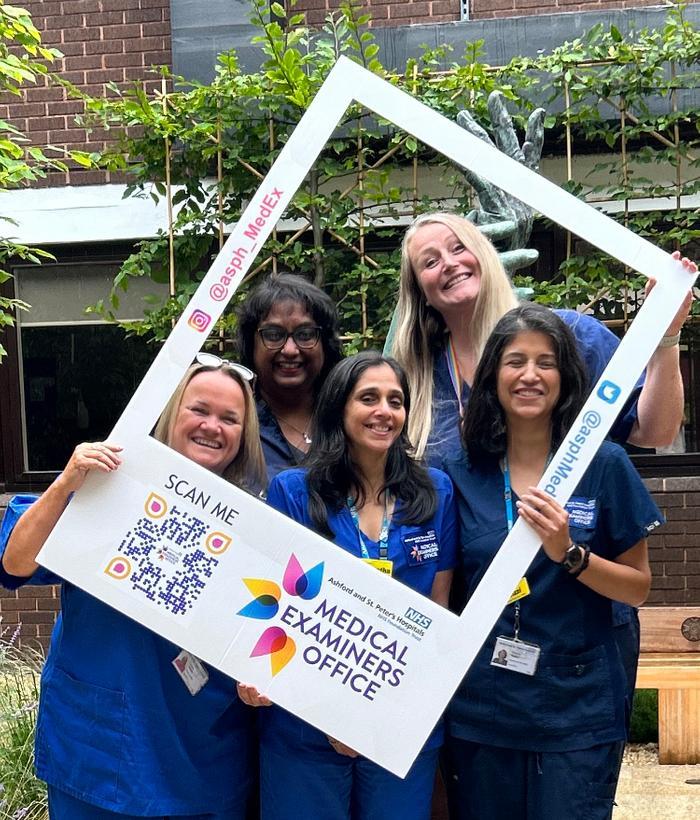
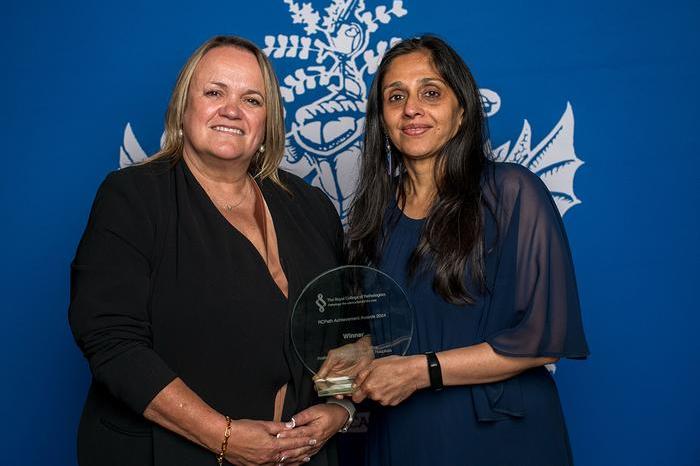
Ms Clare Walker and Mrs Sangeetha Nair.
The Medical Examiners’ Office team hosted by Ashford & St Peter's Hospitals NHS Foundation Trust have created a dynamic, outward looking department where building a service from scratch, they have designed a paperless system for receiving referrals with sufficient electronic data for proportionate scrutiny, and an accessible database.
They have also built strong working relationships with stakeholders including registration services and individual GP practices through in-person visits and virtual support.
They designed and delivered a series of five different community engagement events for GP administrators, GPs and Funeral Directors which have been fantastically well received with audiences of up to 100 at each event.
As a result the medical examiners officer are now scrutinising 100% of acute deaths and 80% of community deaths, long before the service becomes statutory in September.
North West London Pathology Team
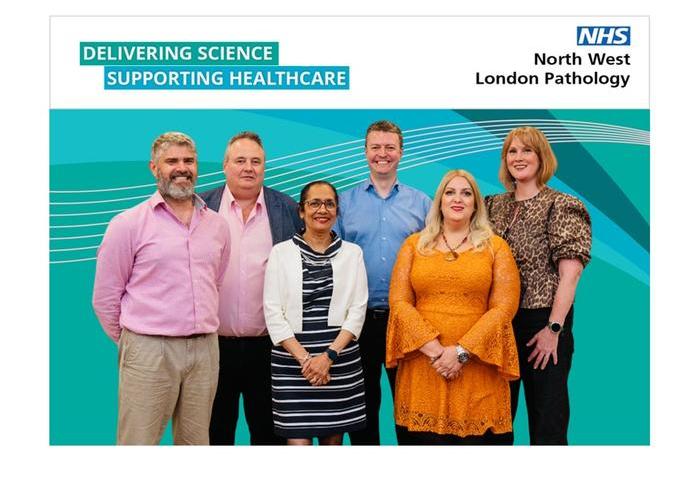
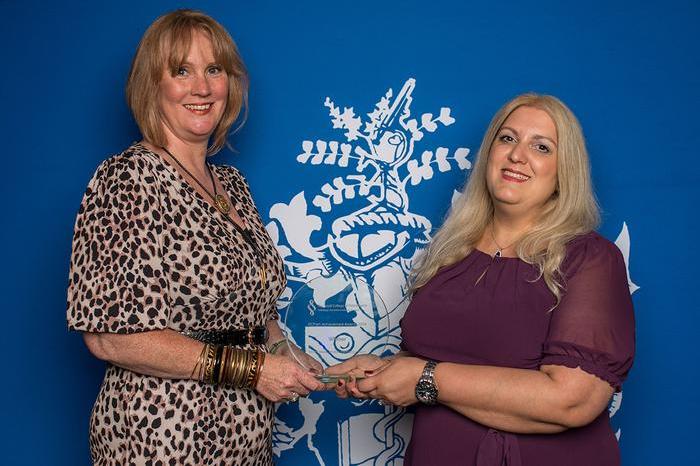
Ms Angela Jean-Francois and Miss Saghar Missaghian-Cully.
North West London Pathology Team successfully completed a digital transformation project completely replacing and updating their Laboratory Information Management System (LIMS) from a collection of wildly different legacy systems spread across seven sites.
Together with the replacement and standardisation of lab software and equipment, the team completed their six-year project within budget despite COVID-19 upheaval, spiking workloads, and resistance from some quarters.
Today their labs process nearly 70 million interactions annually, supporting the health of 2.7million people. They also provide specialist pathology services across the UK, and for healthcare and pathology providers in 30+ other countries.
NWLP are recognised as one of only two ‘Thriving’ UK pathology networks in comparison to the majority of other, longer established networks that have yet to reach the same level. Supporting other networks to achieve the same outcome is extremely important to the team.
Nottingham University Hospitals NHS Trust Cellular Pathology
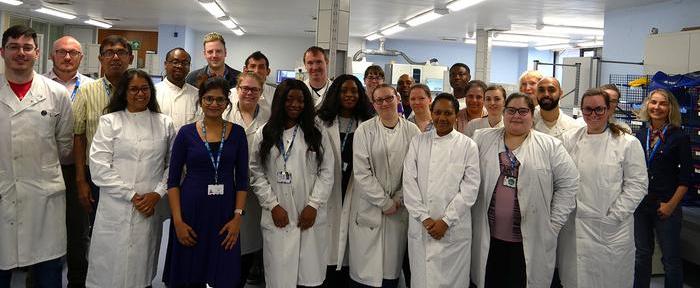
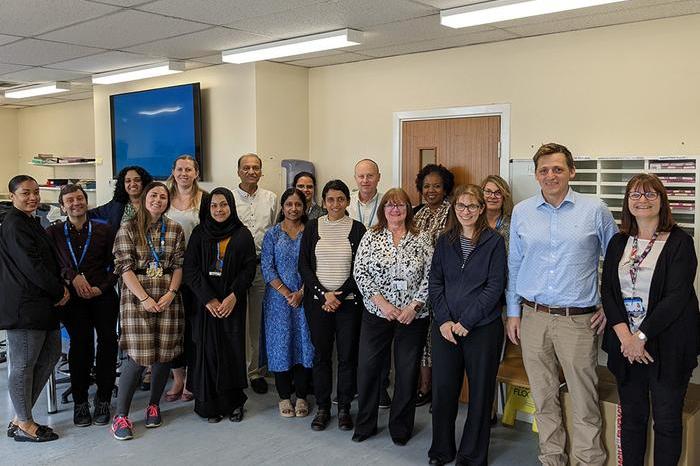
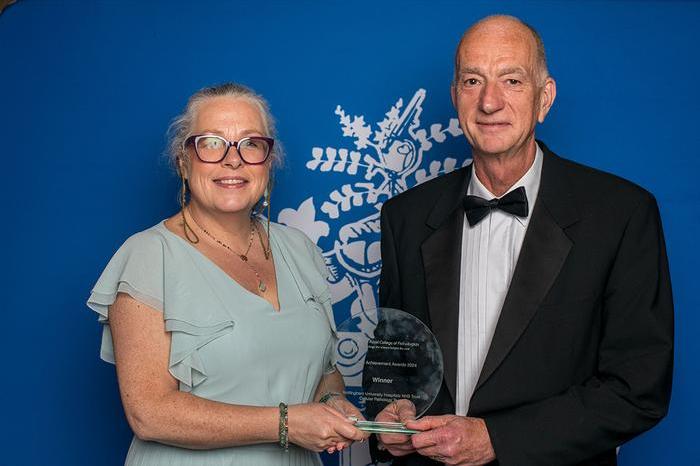
Ms Andrea Gooding and Dr David Clark.
Through the adoption of lean methodology and the pioneering implementation of digital pathology, Nottingham University Hospitals NHS Trust Cellular Pathology Team have revolutionised service delivery, transforming the entire diagnostic pathway of a large acute teaching hospital. With the successful scanning of 100% of cases and over 95% of consultants reporting digitally, they have emerged as a leading Trust in digital pathology implementation.
They have also embraced innovation through implementation of AI- driven decision support tools, enhancing diagnostic accuracy and patient case outcomes.
This has resulted in significantly improved turnaround times for urgent cases, enabled collaborative working across site, improving patient care whilst setting a benchmark for excellence.
The team have worked closely with 21 other NHS Trusts in the PathLAKE plus consortium and aspire to inspire other pathology departments, exemplifying the opportunities created by digital transformation and innovation to improve patient care.
RCPath Achievement Awards - Sustainability awards
Mediclinic Middle East Laboratories Management
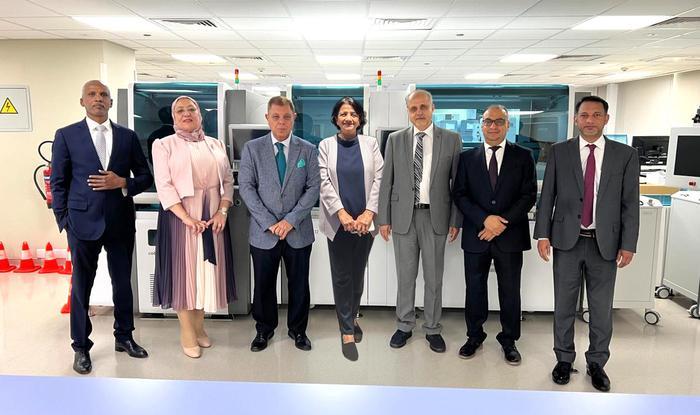
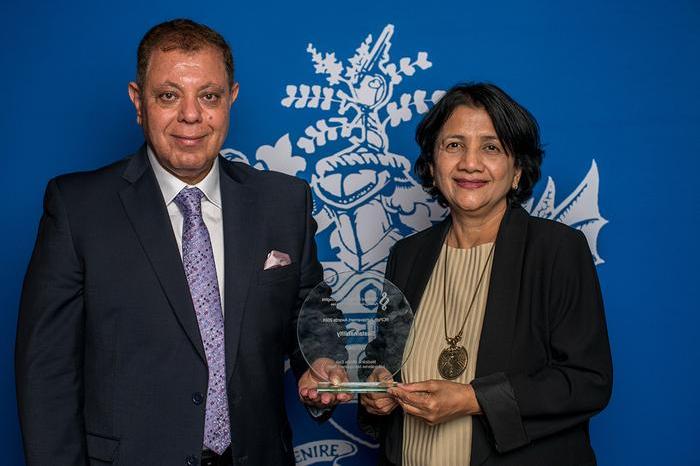
Prof Mahir Alhilaki and Dr Jyoti Shetye
Changes in the provision of healthcare is affected by advances in medical science and technology. The Mediclinic Middle East Laboratories Management Team has placed emphasis on key objectives for the clinical laboratory services namely to:
- Ensure quality, improve efficiency and prove effectiveness
- Respond to needs of clinicians and patients in ensuring accuracy and fast turnaround time for assays
- Drive profitability through cost reduction and income generation
- Achieve sustainability through the modernisation of processes through commissioning of modern and efficient analyzers.
The team has implemented a strategic plan through consolidation and central control to achieve these objectives. The plan included a drive to achieve sustainability through:
- Driving down energy consumption through the reduction of the number of analyzers deployed leading to a lowering of over 53.6% in regent consumption and 61% reduction in reagents storage space. In addition to an over 57% reduction in consumption of water and electricity.
-
Reduction in waste & heat emission through the deployment of efficient modern analyzers.
-
Resource optimisation of performance staff and technologies with a reduction in technical hand-on-time for analysis and reagents preparation to 55.9% and 56% respectively through automation.
Synnovis Transformation Team
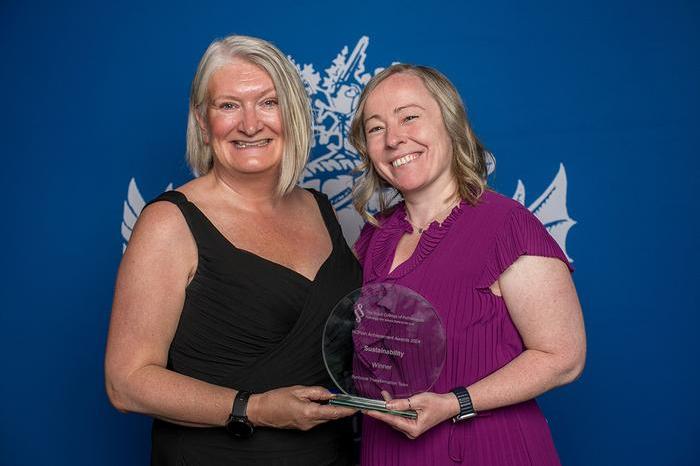
Ms Lucy Hind and Miss Leanne Hughes.
The Synnovis transformation team comprises scientists, project managers and NHS pathologists. Together, they have delivered a hub and spoke laboratory model improving the quality and consistency of pathology services for southeast London.
The new hub will deliver a net carbon saving of 180 tonnes CO2e per year and a further 250 tonnes will be saved from wider improvements in the network provision.
The hub laboratory meets the BREEAM (Building Research Establishment Environmental Assessment Method) excellent sustainability criteria and will be ranked among the top 10% of commercial buildings within the UK.
The contributing factors that have led to this achievement include: extensive recycling of materials during construction, reuse of materials wherever possible within the building and externally through donation to charitable organisations, minimising energy and water usage, encouraging healthy and sustainable travel and involving the local community in the project.
The wider network has also benefitted from the introduction of electric, temperature-controlled courier vehicles and the replacement of disposable plastic sample packaging.
Highly commended
Black Country Pathology Services Team
This team is one of two thriving Pathology Networks in England and has strategically integrated a sustainability agenda. Their hub-and-spoke design aligned clinical, financial and sustainability goals across a broad Integrated Care System (ICS) framework, encompassing over 400 GP practices and 4 acute Trusts.
In partnership with Abbott, the team have implemented AlinIQ Preanalytics powered by Indexor. This pathology-led initiative involves the entire regional healthcare community, including clinical and phlebotomy teams in primary and secondary care.
In addition to significantly smoother and faster patient sample flow by tracking and auto-receipting, Indexor has significantly reduced their carbon footprint by eliminating single-use plastic bags from the process.
Based on processing 15,000 daily samples, the Indexor system is set to prevent 27.9 tonnes of plastic from entering the clinical waste stream, saving around 200 tonnes of carbon equivalent annually. It also improves patient care by reducing lost samples and cutting testing time by an average of 2-3 hrs from collection to booking. This solution has a positive financial impact, with annual savings of £50,000.
MSE Pathology IT Transformation Team
The MSE Digital Pathology Team has revolutionised IT across laboratories, GP practices, acute sites, and community services, achieving in just over 2 years what typically takes twenty. Their commendation by NHS England leaders highlights the national significance of their work.
Their commitment to innovation and collaboration is evident in their implementation of digital pathology solutions like Winpath Enterprise, Cerebro tracking systems, and digital slide scanning technologies. These advancements have notably enhanced diagnostic efficiency and patient care, supporting the sustainability agenda by eliminating paper processes and enabling international collaboration.
The team's efforts have substantially improved service delivery, with digital technologies reducing turnaround times and setting the stage for future artificial intelligence applications.
PathWest Translational Research Group
In less than10 years the Western Australian state pathology service (PathWest), with the University of Western Australia, developed an accidental discovery in a basement lab into a working solution for rapid, antimicrobial susceptibility testing directly from blood cultures. This journey has attracted research funding required for translation into practice, raised a biotech spin out and developed machine learning applications for accelerated blood culture processing. The most recent clinical laboratory feasibility of the team's flow cytometer-assisted antimicrobial susceptibility test (FAST) method show 94% accuracy, 35hr faster than conventional susceptibility tests.
The team has demonstrated FAST feasibility in distant regional centres. As bloodstream infection (BSI) is a time-critical medical emergency, this development lays the foundation for better clinical outcomes in BSI. The technology used is a clinical microbiology application of acoustic flow cytometry applicable to all medically important bacteria and yeasts grown under laboratory conditions
Swansea microbiology medical student clinical apprenticeship team
The Public Health Wales Microbiology Team which serves Swansea Bay University Health Board has provided an annual clinical apprenticeship placement for all (156) second year medical students since 2021. They offer a ‘bench to bedside’ experience, offering small-group laboratory-based teaching which is integrated with microbiology and infectious diseases patient-facing activities.
Each student spends an entire week in microbiology and infectious diseases. Teaching is provided by microbiology consultants, specialist trainees, biomedical scientists, HSSTs, infection control nurses and antimicrobial pharmacists.
The placement is supported by Bug's Life podcasts, published on the Pathology Portal and created by trainees.

